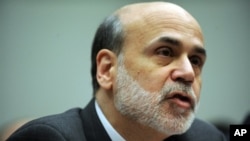Federal Reserve Chairman Ben Bernanke stated his case before Congress Wednesday that the Fed should retain supervision of all U.S. banks and not just those institutions that are too big to fail. The Fed chief spoke before the House Financial Services Committee as new efforts to overhaul the nation's financial regulations get underway.
The Federal Reserve came under fire again as some lawmakers renewed calls to reduce the Central Bank's authority.
Republican Congressman Spencer Bacchus cited experts who claim the Federal Reserve already has too many responsibilities. "Collecting diverse responsibilities in one institution is like asking the plumber to check the wiring in your basement. It seems that when the Fed is responsible for monetary policy and bank supervision, its performance in both suffers," he said.
But Fed chairman Ben Bernanke countered, saying the central bank's expertise in setting monetary policy makes it uniquely qualified to identify risks to the financial system. "Moreover, the insights provided by our role in supervising a range of banks, including community banks significantly increases our effectiveness in making monetary policy and fostering financial stability," he said.
Bernanke's testimony comes as lawmakers attempt a major overhaul of financial regulations.
Under legislation proposed by Senate Banking Chairman Christopher Dodd, the Fed would be given more power to regulate large financial institutions but would no longer supervise smaller banks, those with assets under 50 billion dollars.
Some fed critics are demanding more radical reform.
Congressman Ron Paul argued that a free market economy should set interest rates, not the central bank. "Interest rates fixed by the Federal Reserve is price fixing and it should have no part of a free market economy," he said.
But former Fed Chairman, now White House adviser, Paul Volcker disagreed. "Neither monetary policy nor the financial system will be well served if our central bank is deprived from interest in and influence over - the structure and performance of the financial system," he said.
Besides the Fed's primary responsibility for setting U.S. monetary policy, it currently oversees about 6,000 large and small banks.
Under the proposed reforms, it would also manage a consumer protection agency that would regulate financial products.
Fed Chief Argues for More Central Bank Oversight
- By David Dyar




